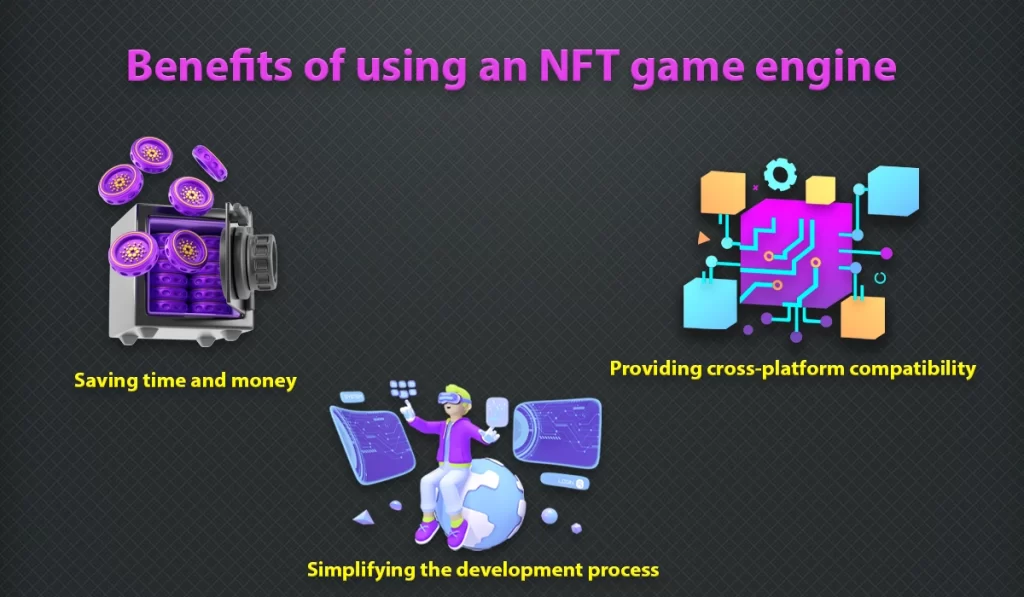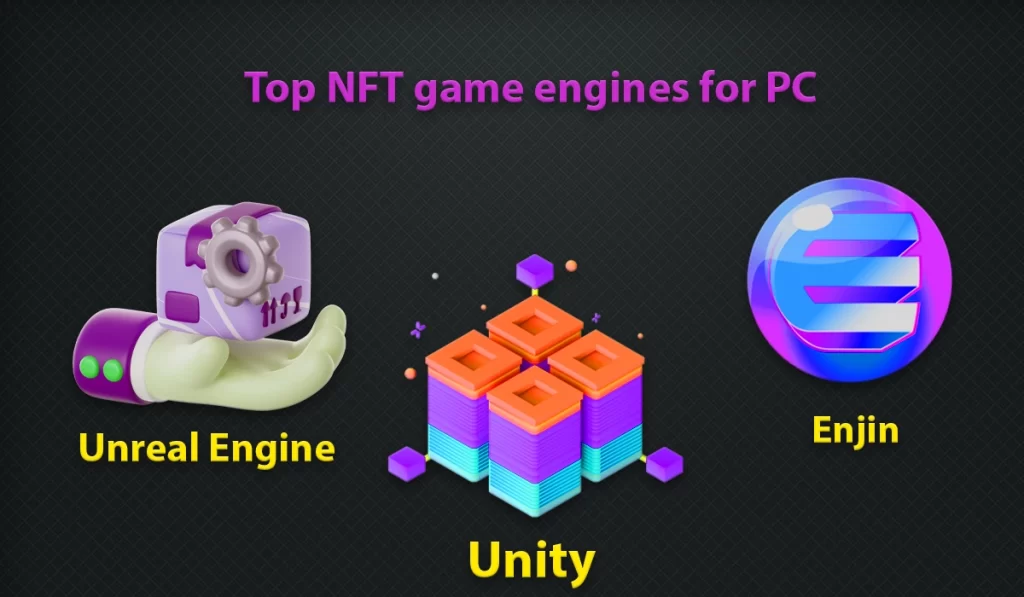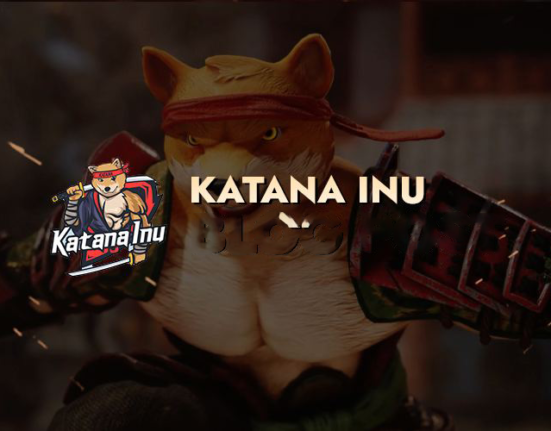NMFT games are becoming quite popular, and building these types of games could be very profitable for the developer as well as the player base, given their economic nature. To create the best NFT PC games, you will need an NFT game engine. This software framework enables you to design and develop an NFT game for different platforms.
NFT game engines are software frameworks that enable developers to create and run play-to-earn games on different platforms. NFT games differentiate themselves from regular games thanks to the integration of blockchain technology and NFTs, which allow players to own game assets that they can trade or sell.
However, like traditional games, creating NFT games requires knowledge of different software and game engines. In this article, we will compare and review some of the top NFT game engines for PC and help you choose the best one for your project.
What are the benefits of using an NFT game engine?
A game engine is a software framework that provides the tools and features for creating and running a video game. A game engine typically consists of several components, such as a rendering engine, a physics engine, a sound engine, an animation system, an input system, a scripting system, and more.

Using a game engine for developing a play-to-earn game has several benefits, such as:
- Saving time and money: Developing a game from scratch can be time-consuming and costly, as it requires writing a lot of code, creating a lot of assets, testing a lot of functionality, and fixing many bugs. Using a game engine can save developers a lot of time and money, as it provides ready-made solutions for everyday tasks and problems, such as rendering graphics, simulating physics, playing sounds, animating characters, handling input, etc.
- Simplifying the development process: Using a game engine can streamline the complicated game development process, providing a unified and consistent framework for managing and organizing different elements and systems. Developers can use the same interface and language to access and manipulate various components of their NFT game rather than dealing with multiple tools and formats
- Providing cross-platform compatibility: If you want to have a large player base, you may want to push for cross-platform compatibility. Doing this can be tedious, requiring different types of optimizations. However, with the appropriate game engine, you can easily create and run your NFT game on various platforms with minimal changes. Developers can use the same codebase and assets to target different platforms, such as Web, PC, Android, iOS, etc., rather than creating separate versions for each platform.
Limitations
Game engines also have some drawbacks. One of the challenges of game engines is their steep technical skills and knowledge requirement. Developers must learn to use the game engine’s interface, language, tools, and features and integrate them with blockchain technology and NFT standards. Another challenge is that it has some limitations or restrictions. Developers may be unable to access or modify some aspects of the game engine or its components, such as the source code, the core functionality, the proprietary libraries, etc.
What are some of the top NFT game engines for PC?
NFT game engines abound, each with its strengths and weaknesses. Depending on your goals, needs, preferences, and budget, you can choose the best NFT game engine for your project. Here are some of the top NFT game engines for PC in terms of popularity, reputation, functionality, and quality:

- Unreal Engine: This is one of the most powerful and widely used game engines for PC and other platforms. Unreal Engine offers high graphics quality, performance optimization, a user-friendly interface, robust asset management, a versatile scripting language (C++), a built-in networking system, manual blockchain integration, difficult smart contract support, specific token standard compatibility (ERC-721), and indirect marketplace integration. Unreal Engine is suitable for developing high-end NFT games with complex functionality and stunning visuals. Some examples of NFT games developed using Unreal Engine are The Sandbox, Blankos Block Party, and Illuvium.
- Unity: This is another popular and widely used game engine for PC and other platforms. Unity offers similar features to Unreal Engine with also support for blockchain integration. Unity is suitable for developing cross-platform NFT games with diverse genres and styles. Some examples of NFT games developed using Unity are Axie Infinity2, Gods Unchained, and CryptoKitties.
- Enjin: This is a game engine specialized for blockchain and NFT game development. Enjin offers low graphics quality, performance optimization, a user-friendly interface, limited asset management, a niche scripting language (Java), external networking solution (Photon), native blockchain integration, easy smart contract support, universal token standard compatibility (ERC-1155), direct marketplace integration. Enjin is suitable for developing simple and accessible NFT games with seamless blockchain integration and functionality. Some examples of NFT games developed using Enjin are Lost Relics, Age of Rust, and The Six Dragons.
What are the features and requirements of an NFT game engine?
Game engines provide NFT game developers with crucial features that help them craft and turn their ideas into reality. These features include graphics quality, performance optimization, user interface, asset management, network compatibility, scripting language, etc.
These game engine features are shared with traditional games and carry similar functions. However, NFT games require specific features that distinguish them from their conventional counterparts.
These features are core requirements for any NFT game, and they include the following:
- Blockchain integration: This refers to how well a game can connect and communicate with the blockchain network that supports the creation and operation of NFTs. Some NFT game engines have native or seamless blockchain integration, while blockchain support may be a bit challenging on other engines.
- Smart contract support: The smart contract support of an NFT game engine refers to how well it can create and execute smart contracts that define the rules and functions of the NFTs in the game. Smart contracts are self-executing programs that run on the blockchain network and ensure the security and transparency of the transactions and interactions involving NFTs.
- Token standard compatibility: The token standard compatibility of an NFT game engine refers to how well it can support and comply with the token standards that specify how NFTs can be created, transferred, and interacted with by users and applications. Token standards are specifications that provide a common interface and functionality for different types of NFTs on various blockchain platforms.
- Marketplace integration: The marketplace integration of an NFT game engine refers to how well it can link and access the marketplace platforms that allow users to buy, sell, and trade NFTs. Marketplace platforms are websites or applications that provide a venue and a service for users to exchange their NFTs with others or via cryptocurrencies.
Wrapping Up…
Choosing an NFT game engine is an important decision that can affect the outcome and success of your project. With the right engine, you can enjoy various benefits, such as saving time and money, simplifying the development process, providing cross-platform compatibility, and supporting multiple genres and styles.
However, you must also consider access to NFT-specific features and requirements, such as blockchain integration, smart contract support, token standard compatibility, and marketplace integration. Ultimately, selecting the best NFT game engine for your project should be based on your goals, needs, preferences, and budget.














Leave feedback about this